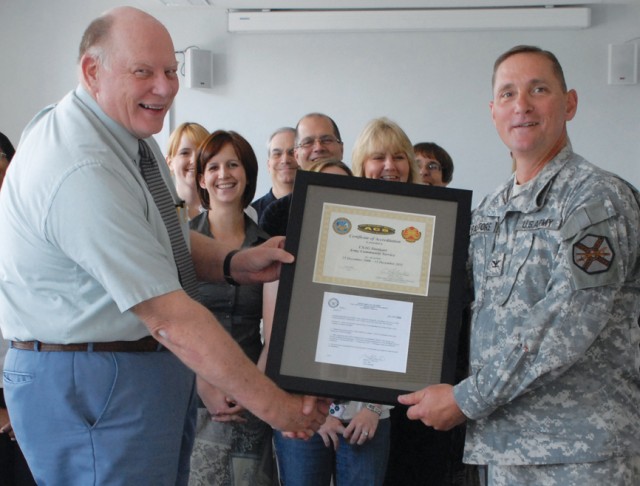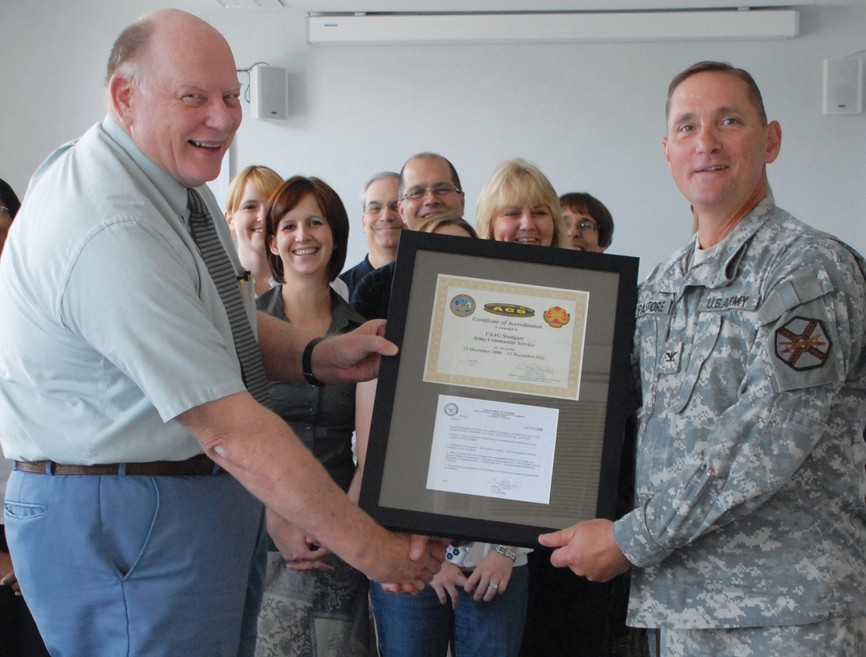STUTTGART, Germany -- It's one of the Army's most important weapons in providing customer service: consistency.
And to ensure Soldiers, civilians and families receive uniform levels of quality support, regardless of their assignment, each Army Community Service center undergoes a rigorous accreditation process.
U.S. Army Garrison Stuttgart's ACS achieved its third accreditation, valid until Dec. 15, 2011, earlier this year.
"The accreditation is something the Department of the Army looks at very carefully. It's a way of standardizing services across the Army," said Marvin Dickerson, the U.S. Army Garrison Stuttgart ACS officer.
The accreditation process evaluates all ACS programs: Family Advocacy Program; Exceptional Family Member Program; Relocation Readiness; Family Employment Readiness; Deployment Readiness; Financial Readiness; Information, Referral and Follow-up; Army Family Action Plan; Army Family Team Building; Army Volunteer Corps, and Soldier and Family Assistance Center.
An accreditation team delves into "every single aspect of the individual programs," Dickerson said. This means nothing is too insignificant to escape scrutiny: standard operating procedures, meeting minutes, training rosters, even the maneuvering clearance for wheelchairs at ACS building entrances are inspected by the team.
Many of the programs ACS has oversight of, such as the Exceptional Family Member Program, rely heavily on other agencies, such as health care providers, Department of Defense Dependents Schools, Child, Youth and School Services; Community Recreation Division, and the Directorate of Public Works - they also are inspected, Dickerson said.
"If they fail their part of the accreditation, then the overall accreditation is gone. It's a community effort," he said.
And while the accreditation process ensures each ACS provides the same quality and level of service, and basic programs, there is still room for customization.
"The Stuttgart ACS has the Stuttgart Newcomer Orientation. Other folks may not have such a program - they may not need it," Dickerson said. "For example, we don't have a huge emphasis on deploying Soldiers, but we just sent out the 554th Military Police Company for a year. We're going to miss them, but we're going to do everything to support their families."
Jim Chastain, the Mobilization and Deployment Program manager, joined the ACS team last month.
He said his focus is to support family members, Family Readiness Groups and the total Army effort. His aim is to hold Army Family Team Building classes and train FRG members in the knowledge, skills, and behaviors needed to be successful.
Since May of 2008, the number of FRGs within the Stuttgart Military Community has doubled to 24 and continues to grow, Dickerson said.
He pointed to other major ACS successes, including the Army Family Action Plan, Volunteer Recognition ceremony and 14 new programs such as the special needs network, a potty training class and support groups.
"We have a great group of people who are dedicated to their jobs," Dickerson said. "It makes a huge difference."


Social Sharing